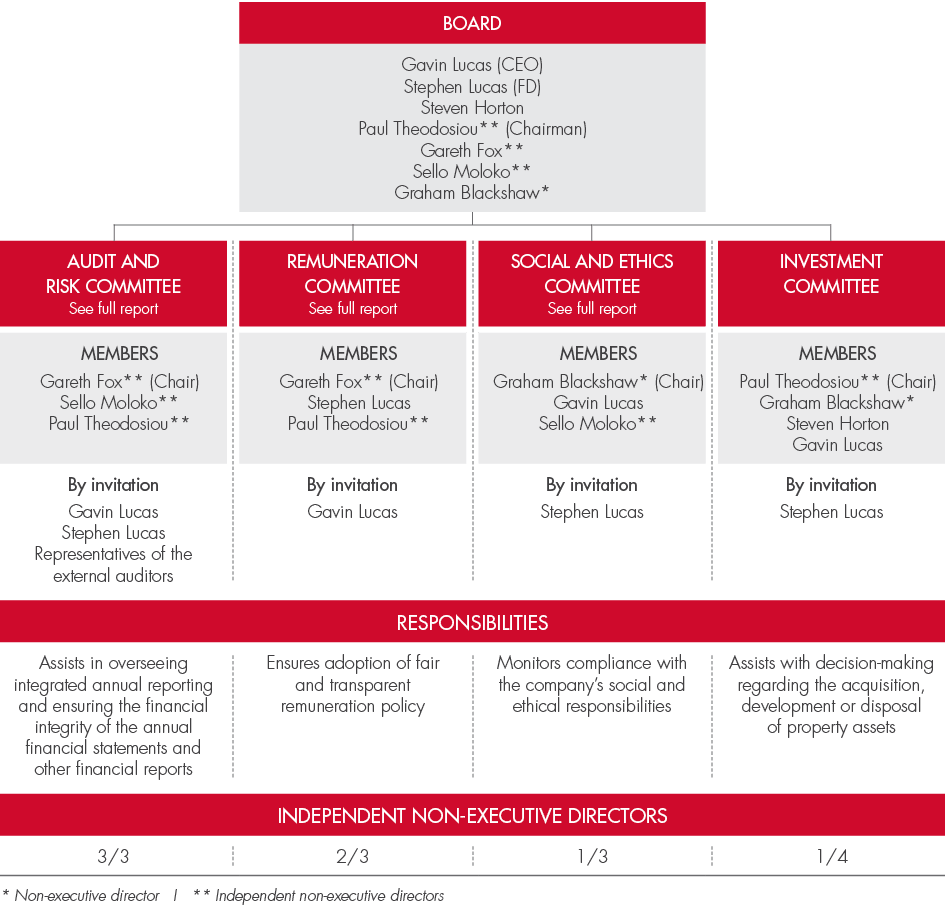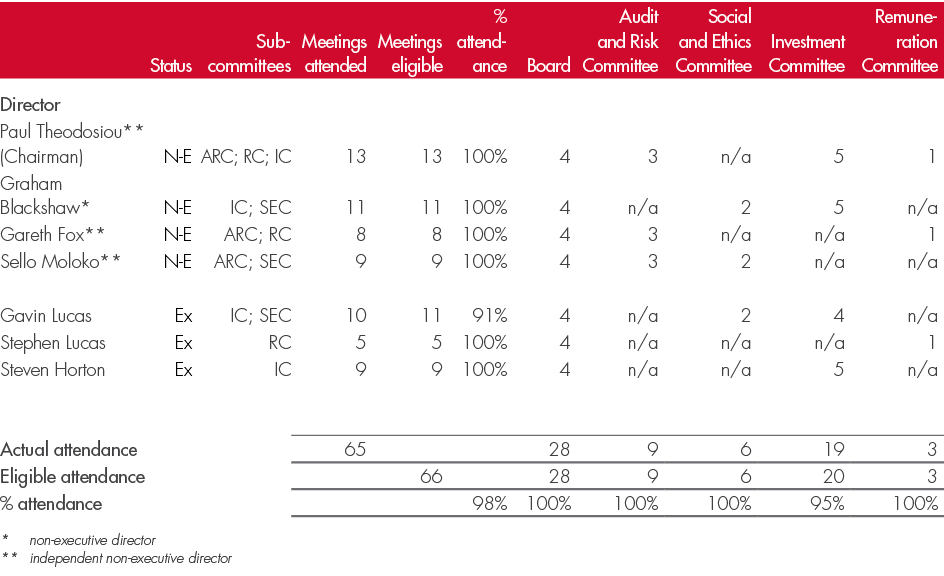Accountability and sustainability
CORPORATE GOVERNANCE
Stor-Age is committed to sound ethical standards and the principles of corporate governance recommended in King III. The board is ultimately responsible for the group’s governance and recognises the responsibility to conduct business according to the company’s foundation principles of integrity, transparency, and accountability. It does this within an appropriate framework of governance and oversight to ensure stakeholder interests are safeguarded.
In regularly reviewing the company’s governance structures, the board exercises and ensures effective and ethical leadership, always acting in the best interests of the company, while at the same time ensuring the sustainability of its business operations.
The company has therefore fully applied the recommendations of King III. As required by the JSE, the application of King III is set out here.
Governance structure

THE BOARD
The board is ultimately fully responsible for the strategic direction, control and management of the company. To assist it in fulfilling these responsibilities, the board has appointed subcommittees, as set out in the governance structure. The board exercises control through a governance framework which includes the review and implementation of detailed reports presented to it and its subcommittees, and the implementation of a continuously updated risk management programme. The board is supported by appropriate internal governance practices and procedures that promote an efficient, objective and independent decision-making culture considering the interests of all stakeholders.
The terms of reference of the board and its committees deal with such matters as corporate governance, directors’ dealings in securities, declarations of conflicts of interest, board meeting documentation and procedures for the nomination, appointment, induction, training and evaluation of the directors.
The board consists of an appropriate mix of individuals to ensure that there is an adequate level of knowledge, skills and expertise which enables them to contribute meaningfully to the management of the company. It comprises seven directors; three are executive and four are non-executive directors, of whom three are independent.
At board level, there is a clear division of responsibilities and an appropriate balance of power and authority, so that no individual has unfettered powers of decision-making or dominates the board’s deliberations and decisions. The board regularly reviews the decision-making authority given to management as well as those matters reserved for decision-making by the board.
The role and responsibilities of the chairman and the CEO are clearly defined and are distinct:
- The CEO is fully responsible and accountable for the overall operations of the group and implementation of the strategy and objectives adopted by the board.
- The independent chairman is responsible for ensuring proper governance of the board and its committees, ensuring that the interests of all stakeholders are protected and facilitating constructive relations between the executive and the board. The chairman is not the chairman of any other listed company.

Top (left to right): Graham Blackshaw, Sello Moloko, Gareth Fox, Paul
Theodosiou
Bottom (left to right): Steven Horton, Gavin Lucas, Stephen
Lucas
BOARD PROCESSES
Directors disclose their personal financial interests at the start of every board or committee meeting and are asked to recuse themselves from any discussions and decisions where they have a material financial interest. Quarterly board meetings consider strategic issues and key operational matters, approve financial results and budgets, monitor the delegated responsibilities and set risk parameters. At these meetings, the executives and the various committees provide feedback on key performance indicators, progress on strategic objectives and various other reports.
A written company policy on share dealings is in place, and formal notification is sent to all employees and directors upon commencement of a closed period.
The board has begun a self-evaluation which is anticipated to be completed by August 2017.
Directors are encouraged to take independent advice at the cost of the company for the proper execution of their duties and responsibilities. The board has unrestricted access to the external auditors, professional advisors, the services of the company secretary, the executives and the employees of the company at any given time.
Directors and committee members receive comprehensive information that allows them to properly discharge their responsibilities. The sponsor is responsible for ongoing director development.
The board functions as a nomination committee and, therefore, selects, appoints and approves new directors formally, transparently, and free from any dominance by any particular shareholder. New appointees are required to possess the necessary skills to contribute meaningfully to the board’s deliberations and to enhance the board’s composition in accordance with recommendations, legislation, regulations and best practice. An induction programme is provided for new directors by the company’s sponsor.
A third of the non-executive directors must resign and stand for re-election at each annual general meeting. Details of directors making themselves available for re-election at the forthcoming annual general meeting.
BOARD AND COMMITTEE MEETINGS
The table below sets out the board and committee meetings held during the reporting period and the attendance at each:

COMPANY SECRETARY
The board is assisted by a suitably qualified company secretary, Henry Steyn, CA(SA) who has adequate experience, is not a director of the company and who has been empowered to fulfil his duties. The company secretary advises the board on appropriate procedures for managing meetings and ensures the corporate governance framework is maintained.
The directors have unlimited professional access to the company secretary. Nothing has come to the attention of the board that indicates non-compliance by the company with applicable laws and regulations.
Given that the company secretary is not a director or an associate of a director of Stor-Age, the board is satisfied that an arm’s length relationship is maintained between the board and company secretary.
The board will satisfy itself on an annual basis on the competence, qualifications and experience of the company secretary.
During the year, the board considered Mr Steyn’s qualifications, experience and performance, and the board confirms that it is satisfied as to the competence, qualifications and experience of Mr Steyn as company secretary.
IT GOVERNANCE
The board believes that the IT governance policy is appropriate. It employs external specialists when considered necessary.
Audit Committee
The Audit and Risk committee’s report is available for download. The committee has considered the JSE proactive monitoring report and this report was tabled at the meetings. Where appropriate the committee applied these recommendations.
